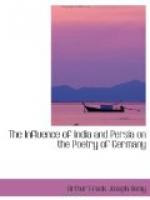From what we have seen thus far we shall not expect in mediaeval literature conscious imitation or reproduction of works from Persian or Sanskrit literature. Whatever influence these literatures exerted in Europe was indirect. If a subject was transmitted from East to West it was as a rule stripped of its Oriental names and characteristics, and even its Oriental origin was often forgotten. This is the case with the greater part of the fables and stories that can be traced to Eastern sources and have found their way into such works as the Gesta Romanorum, or the writings of Boccaccio, Straparola and Lafontaine. Sometimes, however, the history of the origin is still remembered, as for instance in the famous Buch der Beispiele, where the preface begins thus: “Es ist von den alten wysen der geschlaecht der welt dis buoch des ersten jn yndischer sprauch gedicht und darnach in die buochstaben der Persen verwandelt,...."[21]
Poems whose subjects are of Eastern origin are not frequent in the German literature of the middle ages. The most striking example of such a poem is the “Barlaam und Josaphat” of Rudolph von Ems (about 1225), the story of which, as has been conclusively proved, is nothing more or less than the legend of Buddha in Christian garb.[22] The well known “Herzmaere” of the same author has likewise been shown to be of Indic origin.[23] Then there is a poem of the fourteenth or fifteenth century on the same subject as Rueckert’s parable of the man in the well, which undoubtedly goes back to Buddhistic sources.[24] Besides these we mention “Vrouwenzuht” (also called “von dem Zornbraten”) by a poet Sibote of the thirteenth century,[25] and Hans von Buehel’s “Diocletianus Leben” (about 1412), the well known story of the seven wise masters.[26]
* * * * *
The great interest which the East aroused in Europe, especially after the period of the first crusades, is shown by the great number of poems which have their scene of action in Oriental lands, especially in India or Persia, or which introduce persons and things from those countries. To indulge this fondness for Oriental scenery poets do not hesitate to violate historical truth. Thus Charlemagne and his paladins are sent to the Holy Land in the “Pelerinage de Charlesmagne"[27] and in the poem called the “Karl Meinet,” a German compilation of various legends about the Frankish hero.[28] Purely Germanic legends like those of Ortnit-Wolfdietrich and King Rother were orientalized in much the same manner.[29] As might be expected, it is in the court-epic and minstrel-poetry (Spielmannsdichtung) where this Oriental tendency manifests itself most markedly. A typical poem of this kind is “Herzog Ernst.” The hero, a purely German character, is made to go through a series of marvelous adventures in the East some of which bear a striking resemblance to those of Sindbad.[30] The later strophic version (14th century) and the




